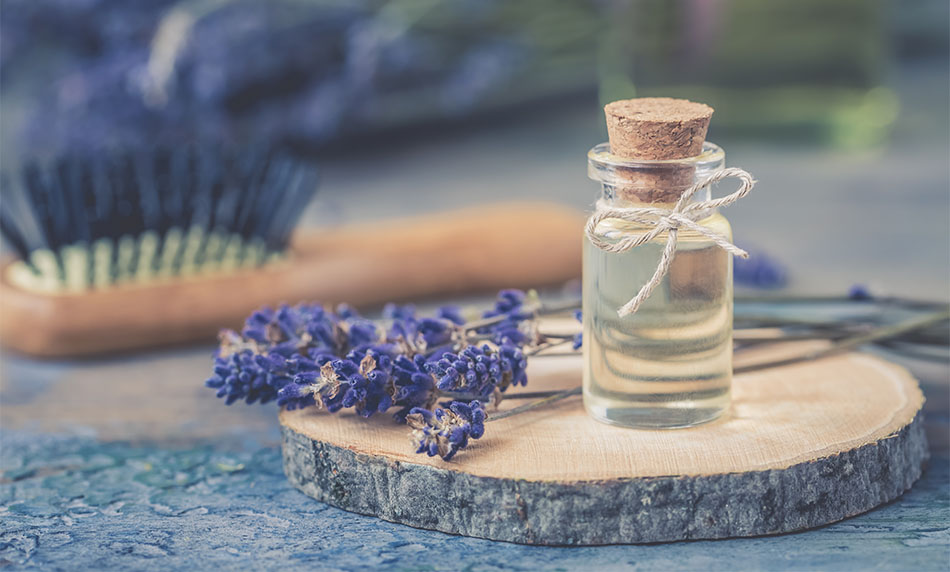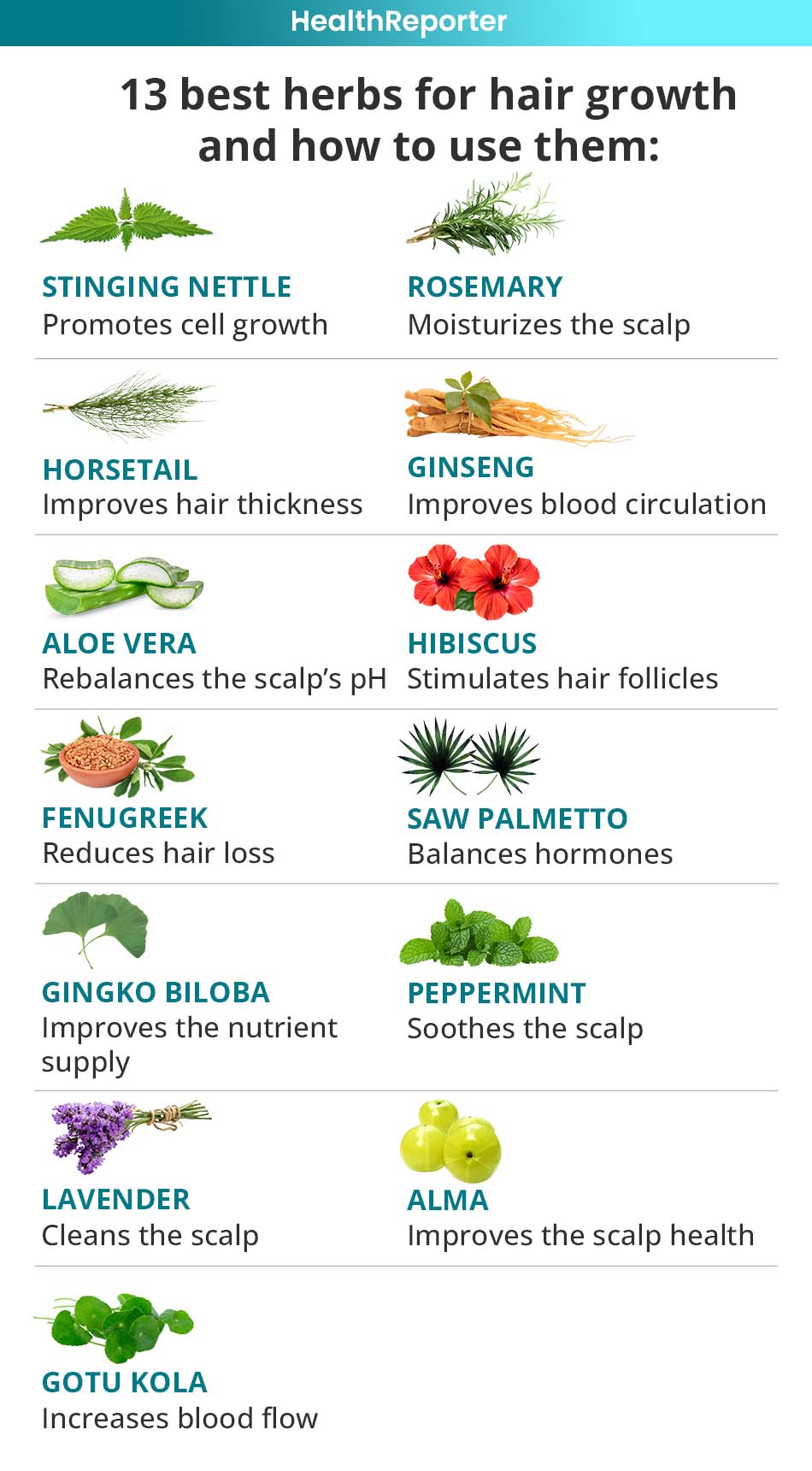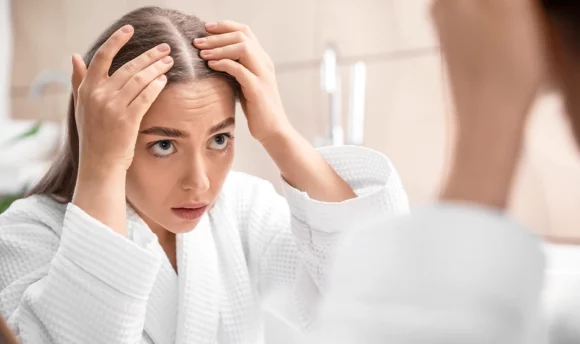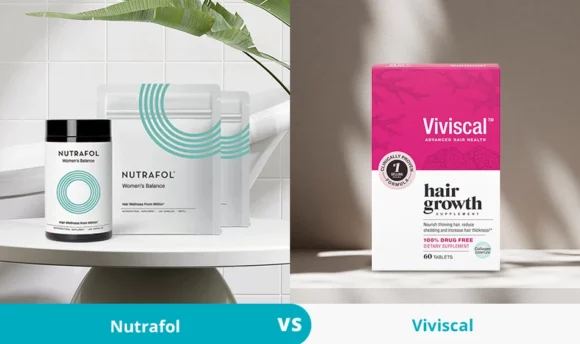Herbs for Hair Growth: Your Natural Remedy for Stronger Hair
For centuries, herbs have been the number one natural remedy for improved hair growth. Which herbs can truly contribute to stronger locks, and how should you incorporate them into your haircare routine?

Herbs for hair growth are natural herbs that have hair-growing properties. If you are struggling with hair loss or thinning or just want stronger hair, these herbal remedies should be your first step toward natural hair growth.
Poor hair health may affect your self-esteem and overall well-being. Due to that, you may seek solutions, treatment options, or even professional medical advice.
Whether you want to treat hair loss or make your hair thicker and stronger, you should try herbal products that promote hair growth. But first, let’s see which herbs are shown to improve that.

13 Best Herbs for Hair Growth and How to Use Them
By using herbal hair growth remedies, you can tap into the natural rhythms of hair growth. Among various herbs that can promote hair growth, these 13 herbs have been proven to be the most effective.
#1 Stinging nettle
Studies have shown that the stinging nettle, also known as Urtica dioica, may stimulate hair growth in several ways.
Firstly, it promotes cell growth in the hair follicles. Secondly, it blocks dihydrotestosterone (DHT), which is responsible for hair loss. The stinging nettle is also rich in beta-sitosterol, which promotes hair growth.
Furthermore, this herbal remedy is rich in vitamins and minerals, including iron and retinol, which are beneficial for skin and hair health. Besides, stinging nettle has been shown to have antimicrobial properties.
There are several different ways to incorporate stinging nettle into your haircare routine and encourage growth.
For example, you can find stinging nettle as a supplement, usually in capsule form, or as a powder for dissolution and as a liquid herbal extract. It is widely available, and you don’t need a doctor’s prescription.
Supplements are intended for systemic, oral use. Some general dosage to treat hair loss is 300mg a day.
Another way to take stinging nettle is to drink it as a nettle tea tonic. Simply infuse fresh or dry leaves in hot water.
A more effective way to use stinging nettle is to infuse it as a hair oil. This herbal hair oil penetrates the pores of the scalp, nourishing and repairing damaged follicles. In this way, nettle oil improves scalp health.
You can add nettle oil to any homemade shampoos and hair products. Otherwise, you can use it alone as a conditioner. In that case, leave it overnight and wash it off in the morning.
Finally, you can use nettle for hair growth by simply boiling it, letting it cool, and then soaking the hair in it for a few minutes.
While stinging nettle has many benefits, you have to be aware of some potential side effects. For example, it may cause an allergic reaction if you are allergic or sensitive to stinging nettle.
It can also interact with some medications, including:
- Blood-thinners
- Diuretics
- Blood pressure drugs
- Anti-inflammatory drugs
If you take one of those drugs, please consult your doctor before taking the nettle.
#2 Rosemary
Rosemary oil supports hair growth and regrowth by improving blood circulation in the scalp and nerve growth. Therefore, it prevents resting hair follicles from being deprived of blood supply and dying off.
Besides its hair growth-promoting activity, it is also effective in preventing premature graying. And, due to rosemary’s moisturizing properties, it can treat a dry, flaky scalp. In fact, a dry scalp may actually be responsible for hair growth issues.
Now, there are a few ways to use it in your haircare routine. You can choose one that suits you best.
You can massage the oil directly onto the scalp. Note that you should also use carrier oil, such as coconut oil.
Mix about 5 drops of rosemary oil with a teaspoon of carrier oil and massage into the scalp after washing your hair. You can then rinse it out or leave it on the scalp.
Also, you can add a few drops of essential oil to your hair product. It can be your homemade shampoo or any other shampoo, conditioner, lotion, or cream. However, be careful not to add too much rosemary oil. About 5 drops per ounce of the product are enough.
However, be cautious. Too much rosemary oil can cause skin irritation. So, when you are applying the oil to your scalp, stay on the recommended dose and use carrier oil.
Otherwise, you may end up with scalp irritation. Although this is not dangerous, it may cause discomfort.
You should also avoid getting the oil in your eyes, as it may cause irritation. If that occurs, rinse your eyes with water.
Because its safety isn’t studied enough in pregnant and breastfeeding moms, be careful, even though the rosemary oil is applied only topically.
#3 Horsetail
Horsetail, also known as Equisetum, is one of the hair growth herbal supplements that are beneficial for hair health in general. It’s also one of the most widely used herbs in haircare products.
Horsetail is rich in silica, which penetrates (and builds) the hair follicles and matrix, thus improving hair thickness. Furthermore, it strengthens hair and makes it less brittle.
You can take it as a supplement (for oral administration) or in the hair product which already contains it.
Note, however, that you should drink enough fluids if you take the horsetail orally. Namely, horsetail has diuretic properties.
#4 Ginseng
Ginseng herbal extracts are common ingredients in hair products, promoting a healthy scalp. It is known to have hair growth potential, as it improves blood circulation to the hair follicle.
Furthermore, it contains saponins, which are thought to promote new hair growth.
Ginseng is an Ayurvedic herb used to treat many ailments and help you grow your hair. You can use it as a supplement or in the form of tea, but it can also be used as a hair tonic.
Because ginseng may cause trouble sleeping and insomnia, you shouldn’t take it before bedtime. Also, it shouldn’t be taken orally for long periods in order to avoid side effects.
It may (in rare cases) cause headaches, gastrointestinal issues, agitation, menstrual problems, or changes in blood pressure.
#5 Aloe vera
Aloe vera is one of the famous hair growth herbs. Aloe vera gel rebalances the scalp’s pH, thus encouraging hair growth.
Besides promoting the growth of hair, it is beneficial for hair follicle hydration. It, therefore, has positive effects on the hair and promotes healthy hair growth.
You can apply aloe vera gel directly to the scalp or make an aloe vera conditioner. You can also find aloe vera hair masks and hair tonics on the market. However, it is usually included in polyherbal ointments.
The only thing you should be careful about is that topical aloe vera might irritate your skin.
#6 Hibiscus
One of the hair growth herbs in Ayurvedic medicine is hibiscus. It is believed to stimulate hair follicles and increase follicle size and hair growth.
Also, hibiscus leaves contain bioactive compounds beneficial for hair health. It is also thought to prevent and reduce hair loss and hair shedding.
You can use it in your haircare regimen as a hair mask, hair oil, or hair pack. However, be cautious if you are pregnant, as the effects of hibiscus have not been adequately studied in this population.
Also, avoid hibiscus if you suffer from low blood pressure or blood sugar, as it can lower both of them down.
#7 Fenugreek
Fenugreek is an herb used primarily in cooking; however, it is also often used as a medicine. One of the uses of fenugreek is for hair growth. It can help with mild to moderate male and female pattern hair loss.
While it isn’t entirely clear how it works, fenugreek’s hair growth activity is likely due to increasing scalp circulation and controlling the production of DHT.
There are 2 ways to use fenugreek. You can use it in cooking or apply it directly on your scalp in the form of powder.
There are also some potential side effects, and those include headache, dizziness, nausea, diarrhea, and other digestive issues. Furthermore, you shouldn’t use fenugreek during pregnancy, as its effects are not studied enough in pregnant females.
#8 Saw palmetto
Saw palmetto is quite similar to stinging nettle in stimulating hair growth, so it is a good idea to combine these two for better results in the form of topical hair supplements.
This herb helps with hormonal imbalances that cause hair loss. It also suppresses the overproduction of DHT.
#9 Ginkgo biloba
The vasodilator (widening of the blood vessels) properties of Ginkgo Biloba make this herb good at reducing hair loss. Vasodilation allows for better blood supply to the hair follicles. This ultimately means a better supply of nutrients to the hair shaft.
The best way to take it is orally as a supplement. However, in rare cases, ginkgo may cause unwanted side effects, such as dizziness, nausea, diarrhea, and headache. Also, use caution if you are pregnant or on anticoagulation therapy.
#10 Peppermint
Peppermint provides scalp healing to promote hair growth. It primarily soothes and moisturizes the irritated scalp, which is sometimes the main cause of hair thinning and poor hair condition.
Peppermint contains menthol, which dilates blood vessels and increases blood flow to hair follicles.
Moreover, peppermint also stimulates hair follicles to grow new hair.
It is best used directly on the scalp as a hair oil. However, you can also drink it as tea.
#11 Lavender
Due to its antimicrobial properties, lavender will promote hair growth by keeping the scalp free of anything that interferes with natural hair growth, such as fungi, parasites, etc.
It is usually used topically as part of hair oils, but it can also be consumed as a tea. Bonus – the tea can also relax you!
#12 Amla
Amla is widely used for improving hair and scalp health. It works by inhibiting 5-alpha reductase, an enzyme responsible for hormonal changes causing androgenic alopecia. In fact, amla shares a mechanism of action with finasteride, the medicine used in hair loss treatment.
Amla oil can strengthen hair, reduce hair loss and stimulate hair growth. It may also prevent premature graying of the hair and prevent or treat dandruff, scalp infections, and scalp dryness.
It is best used when applied directly on the scalp, and it is pretty safe. However, in some rare cases, it may trigger Lichen planus pigmentosus or cause skin irritation.
#13 Gotu kola
Gotu kola is one of the most popular herbs in Ayurvedic medicine. It is thought to increase blood flow to the hair follicles, which consequently stimulates hair growth.
Gotu kola is applied directly to the scalp as a herbal ointment. While generally well tolerated, topical application may sometimes cause skin irritation.
Also, you should not use gotu kola if you are pregnant or breastfeeding or if you have liver disease. Its effects have not been well studied in pregnant and breastfeeding mothers. It is also not recommended in people younger than 18 years of age or in those with a history of skin cancer. If you are scheduled for surgery within the next 2 weeks, postpone the use of this herb. Gotu kola is metabolized in the liver, and there is a risk of liver damage, hence the cautions.
Other Herbal Supplements for Hair Growth
In addition to the above-mentioned herbs for hair growth, there are other herbal remedies that may stimulate hair growth that can be found in both haircare products and teas.
These include red clover, burdock, holy basil, gooseberry, giant dodder, bitter apple, false daisy, night-flowering jasmine, marking nut, oriental arborvitae, espinosilla, goji berry, tuber fleece flower, and others.
Can Herbs Help With Hair Loss?
Herbs can actually help with hair loss. However, be aware that no herbal supplement will give you a full head of hair.
Herbal remedies for hair loss can definitely help support healthy hair and scalp, improve hair density, strengthen hair, and stimulate the hair growth cycle.
Some of the herbs, including saw palmetto and ginseng, even have an evidence-based effect against alopecia.
FAQs
All of the herbs mentioned above have positive effects on hair thickness. However, fenugreek is probably the best choice for hair thickening, as it stimulates the blood flow to the scalp and nourishes the hair follicles.
Yes, due to their hair-growing properties, they may stimulate the hair growth cycle.
Some of the hair-growing herbs are also used as spices, including fenugreek and rosemary. You can include these spices in your diet.
A Word From a Trichologist
Poor hair condition, dull appearance, or hair loss can occur for a variety of reasons. Sometimes it is caused by hormonal or nutritional imbalances. In this case, herbs can be very beneficial.
Herbs are also used in the pharmaceutical industry. So we can say that herbs are actually medicine.
Some herbal remedies for hair growth even have the same mechanisms of action as hair loss medications. So it is worth trying natural treatments first.
However, consult a medical professional before starting any hair growth treatment. While herbal extracts are usually safe and beneficial for your hair and overall health, some people need to be cautious about herbal supplements.
Conclusion
Herbal remedies for hair growth will help you achieve stronger and thicker hair. Although herbs will not grow you a full head of hair, they will help you stimulate growth in moderate amounts.
These 13 herbs are probably the best fit if you are looking for hair growth treatments in natural products. They have different mechanisms of action, but any one of them can help you on your way to healthy hair.
You can find these herbs in various forms, such as hair oils, tonics, shampoos, or oral supplements. The best way to use them depends on your expectations. In general, topical application is more effective than systemic application.
Use these herbal remedies appropriately and be aware of the side effects of each herb. Some of these herbs can cause irritation and other adverse effects. You should consult your healthcare provider before using any herbal supplement.

















































 Select your language:
Select your language: 








